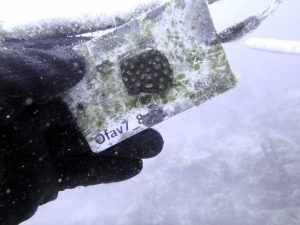Lizandra Portal/Staff Writer
In collaboration with NASA and the Coral Restoration Foundation, FIU has deployed two coral nurseries off the Aquarius Reef Base in Tavernier, Florida just south of Key Largo, according to fourth year PhD biological sciences student Daniel Merselis.
The nurseries started in 2016 by taking the minimal amount of tissue from corals to allow restorationists to look at the microbes. Each nursery boasts about 300 coral fragments that are being used to further coral restoration.
“What’s special about these nurseries is that they let us look at corals across depths,” Anthony Bellantuono said, a post-doc FIU alumnus working in the department of biological sciences. “Whereas nurseries are typically used to grow corals in relatively shallow waters, perhaps 30 feet or less, we have the same original coral colonies replicated and fragmented at 60 and 90 feet.”

Photo courtesy of Anthony Bellantuono.
The main focus of the coral restoration experiment is how corals interact with the microbial communities across depths, according to Bellantuono.
“We have found differential growth of corals at depths, so some are faster growers,” said Bellantuono. “Which is something that is important and useful in terms of the restoration context. We want to identify those fast growers and later on more disease tolerant [strains of coral] for restoration purposes.”
As part of the FIU Marine Education and Research Initiative, the Medina Aquarius Program is dedicated to the study and preservation of marine ecosystems worldwide and is enhancing the scope and impact of FIU on research, educational outreach, technology development and professional training, according to aquarius.fiu.edu.
The way coral reef restoration works, according to Merselis, is that you fragment pieces of coral and bring them into nurseries to grow them, then fragment them again to start the process over until what was once a single small piece of coral becomes many, and restorationists begin to out plant them to actively help in the conservation of the reef.
“We started working with two species of coral, Orbicella faveolata and Orbicella annularis, and these are two species that, while they have been worked on by other restorationists, they’re still very new to restoration,” Merselis said. “So, it’s exciting that we are starting to break these species in for restoration.”
However, the work being done at Aquarius, which is the world’s only undersea habitat dedicated to research, is not only limited to graduate students.
“In the construction of this nursery early on, we had the eager and very appreciated help of an undergraduate who stood out there in the sun and the heat with Dan and I fragmenting and mounting pieces of coral onto cards which then went into these nurseries,” Bellantuono said.
Aquarius is 60 feet underwater and is about the size, and color, of a school bus, according to Merselis. Researchers spend their entire day in this underwater habitat where they have everything they need, including a kitchen and bunks.
A typical dive to a 60-foot depth would have to be done in 14 minute intervals for health reasons, but the time it takes to build a nursery is about five hours, according to Merselis.
“[W]orking in that saturation of environment at Aquarius really gives researchers the gift of time,” Bellantuono said. “It makes lengthy studies at depth possible that wouldn’t really be practical in other ways.”
The work being done at Aquarius is all thanks to Manuel A. Medina, the sponsor of the Medina Aquarius Program.
“Mr. Medina made it possible for FIU to save Aquarius,” Merselis said. “The world’s only undersea research base would have been lost, but his generous donations and sponsorship has allowed it to continue.”
The experiments being conducted in these underwater nurseries will continue, according to Bellantuono, and the knowledge collected, he said, will be used in a larger scale to further empower conservationists to restore our coral reefs.






Be the first to comment on "FIU works to restore coral reefs through Aquarius program"